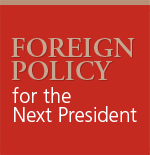Source: Carnegie Endowment
 The current U.S. approach to the Israeli–Palestinian conflict actually further undermines the chances for a two-state solution. Rather than pretending that an agreement is possible now, it would be far better if U.S. efforts in the remainder of this calendar year began to address the underlying problems to improve the scenarios for the next administration, urged Middle East expert Nathan J. Brown in a new report.
The current U.S. approach to the Israeli–Palestinian conflict actually further undermines the chances for a two-state solution. Rather than pretending that an agreement is possible now, it would be far better if U.S. efforts in the remainder of this calendar year began to address the underlying problems to improve the scenarios for the next administration, urged Middle East expert Nathan J. Brown in a new report.
The next U.S. administration will face a series of bleak choices on the Israeli–Palestinian conflict, of which a two-state solution remains the most attractive. But the framework to support a two-state solution has collapsed. A two-state solution will require a more viable and unified Palestinian leadership and less intrusive Israeli security in the West Bank.
To keep a two-state solution alive for the next administration, the Bush administration should:
- Stop blocking a power sharing agreement between Hamas and Fatah, the best short-term path toward restoring Palestinian leadership.
- Pursue a realistic cease-fire between Israel and Hamas by supporting Egyptian mediation efforts.
- Initiate indirect contact with Hamas through President Abbas—both the costs and benefits of direct engagement with Hamas are greatly exaggerated.
- Develop Palestinian institutions capable of authoritative decisions, rather than short-sightedly embracing individual leaders.
- Support Fatah reform—the party’s last hope for new blood and credibility.
- Back the restoration of democratic rule in Palestine by reviving the terms of Palestine’s Basic Law or interim constitution.
“The menu that will greet the incoming U.S. administration in January 2009 is short and unappetizing. The most attractive option—revival of the two-state solution—will require extremely robust efforts indeed. And it will also demand more patience, concerted attention, and tolerance for risk than the United States has shown so far in dealing with the conflict.”
About the Author
Nathan J. Brown is director of the Institute for Middle East Studies at the George Washington University, a nonresident senior associate at the Carnegie Endowment, and a distinguished scholar and author of four well-received books on Arab politics.





